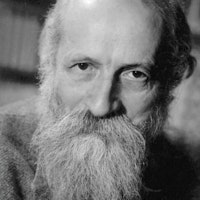It is written in the psalm: “I shall not die, but live.” In order really to live, man must first give himself to death.
Martin Buber

Really to Live
Topic: Life Beyond Death & the Spirit World
It is written in the psalm: “I shall not die, but live.” In order really to live, man must first give himself to death. But when he has done so, he discovers that he is not to die, that he is to live.
Martin Buber
(1878-1965) JudaismTen Rungs
Buber, Martin. “Ten Rungs: Collected Hasidic Sayings by Martin Buber, Olga Marx,” 1938, p. 53, Readings.com.au, www.readings.com.au/products/4828122/ten-rungs-collected-hasidic-sayings.

Martin Buber
Theme: Life Beyond Death

About This Martin Buber Quotation [Commentary]
Martin Buber’s statement, “It is written in the psalm: ‘I shall not die, but live.’ In order really to live, man must first give himself to death,” explores the connection between life and death in understanding true existence. By referencing the psalm, Buber points to the idea that real life emerges through a confrontation with death—not as an end, but as a transformative process. This surrender, not of physical life but of the self and worldly attachments, opens the way to a fuller experience of being.
Buber explains that once a person gives themselves to death, they discover they are meant to live, not die. This realization suggests a spiritual awakening, where fear of mortality is replaced by a deeper sense of freedom and vitality. True life, then, is found by moving beyond the fear of death, allowing one to live with a renewed awareness of life’s sacredness.
The theme of “Life Beyond Death” fits well with Buber’s message, as he emphasizes that life begins where the fear of death ends. His insight, rooted in Hasidic tradition, points to spiritual renewal available in the present moment, not in some distant afterlife. Buber reminds us that life’s meaning is not in avoiding death but in embracing existence more fully through this transformation.
Ten Rungs: Collected Hasidic Sayings
‘For there is no rung of being on which we cannot find the holiness of God everywhere and at all times’ The sacred tales and aphorisms collected here by Martin Buber have their origins in the traditional Hasidic metaphor of life as a ladder, reaching towards the divine via ascending rungs of perfection. Through Biblical riddles and interpretations, Jewish proverbs and spiritual meditations by turns profound, fanciful and tender, they seek to awaken in the reader a full awareness of the urgency of the human condition, and of the great need for self-recognition and spiritual renewal. Progressing from The Rung of God and Man through to the ultimate Rung of Redemption , Ten Rungs provides a profound, exquisite insight into the mystical piety and joy that defines Hasidic lore. Yet, true to Martin Buber’s own faith in the dialogic relation between men as a mirror of God’s eternal presence with us, they never cease also to emphasize practical advancement and the central meaningfulness of earthly existence. ‘No one can really be devout in relation to God, if he is not devout toward His creation And so, dear reader, these pages are not concerned with the mysteries of heaven, but with your life and mine, in this hour and the next.’
—Martin Buber, Olga Marx [Ten Rungs: Collected Hasidic Sayings (via Readings Website)].
Additional Martin Buber Quotes
Resources
Related Quotes
Copyright © 2017 – 2025 LuminaryQuotes.com About Us